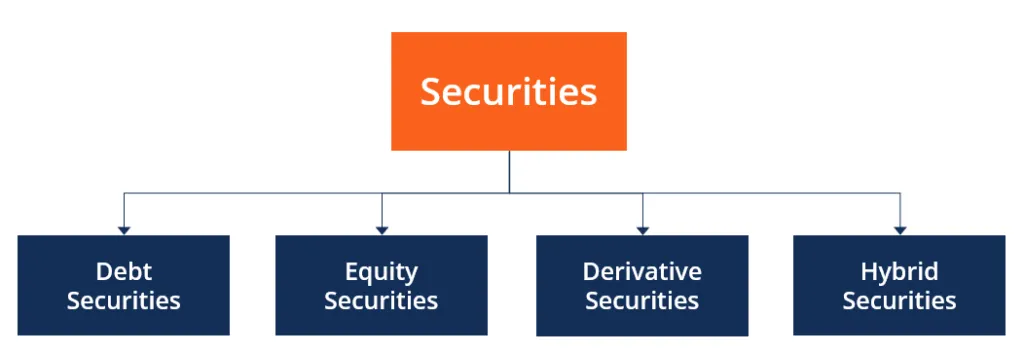Overview of Securities in the Australian Financial Market

What is a security?
Security refers to a broad range of financial instruments that individuals and entities use to secure capital and engage in investment activities. These instruments can be categorized into equity and debt securities, each serving specific financial roles.
Equity securities, such as shares of a company, represent ownership and potentially offer dividends and capital gains. On the other hand, debt securities, like corporate bonds and government bonds, are investment forms that promise regular interest payments and the return of principal at maturity.
The Role and Importance of Securities in Australia’s Economy
Securities play an important role in Australia’s economic framework by facilitating capital flow and investment. They help companies and government entities to raise funds that are crucial for expansion, development, and operations.
This financial mechanism supports not only the entities involved but also contributes to the overall economic stability and growth. The Australian markets are known for their liquid and regulated market conditions, which attract both local and international investors looking for reliable and effective investment strategies.
Types of Securities in Australia

In Australia, the securities market is categorized into different types, each with specific characteristics that cater to various investor needs.
Equity Securities
Equity securities represent an ownership interest in a company. When you buy equity securities, you are purchasing shares of a company. In Australia, these shares are traded on the ASX, where major companies list their equity.
Owning these shares does not entitle you to fixed payments but potentially allows you to benefit from dividends and capital gains if the company’s value increases. Equity securities also come with voting rights, enabling shareholders to influence the company’s decisions through voting on corporate matters.
Debt Securities
Debt securities are essentially a form of borrowed money that the issuer is obliged to pay back with interest by a specified maturity date. This category includes government bonds and corporate bonds. Investing in Australian debt securities is considered beneficial because it generally offers lower risk and a stable income through regular interest payments.
Hybrid Securities
Hybrid securities combine features of both debt and equity securities. Common hybrids in Australia include convertible notes, which investors can convert into equity at a later date under specific conditions. Hybrids may offer fixed interest payments like debt securities while also providing the conversion privilege, which can be lucrative if the company’s stock price increases.
Derivative Securities
Derivative securities derive their value from an underlying asset. They are used for various purposes, including hedging risks, increasing exposure to price movements, and speculation. In Australia, derivatives traded on the ASX include options and futures, which can significantly impact both individual investors and the market by potentially offering high returns at higher risks.
How Securities Trade in Australia
In Australia, securities trading occurs through structured and regulated platforms such as the Australian Securities Exchange (ASX).
The ASX plays a crucial function in the securities market by providing a platform for buying and selling financial instruments. It is one of the world’s leading exchange groups and is instrumental in the secondary market where investment securities like exchange-traded funds and mutual funds are actively traded. The ASX helps in maintaining a liquid and regulated market, ensuring that the trading environment is efficient and accessible to all market participants.
The ASX facilitates both primary and secondary market transactions, ensuring a robust environment for trading various securities like stocks, bonds, and other financial instrument.
Primary and Secondary Markets on the ASX
In the primary market, securities are created and sold for the first time through mechanisms like Initial Public Offerings (IPOs). An IPO is significant as it allows a company to raise capital by offering shares to the public, thereby transitioning from a private to a public entity. This process is crucial for companies seeking to expand and requires substantial investment, leveraging public funding as a means to bolster cash flow and invest in commercial enterprises.
The secondary market, which is more commonly interacted with by individual investors, involves the trading of existing securities. This market allows investors to buy and sell shares issued during an IPO or other primary market offerings.
It is essential for providing liquidity and enabling price discovery for the securities traded on the exchange. The functionality of this market is integral to maintaining a regulated market that is transparent and fair for all participants.
Investing in Australian Securities
Investing in Australian securities involves a few critical steps, tailored to ensure that individuals are well-equipped to navigate the regulated market.
- Understand the Basics: New investors should familiarize themselves with basic investment concepts and the specific characteristics of different types of securities available on the ASX, including common stock and other registered securities.
- Account Setup: Investors need to set up a trading account through a broker who participates in the ASX. This account will be crucial for holding securities, typically managed through a direct registration system.
- Research and Planning: Effective investment requires thorough research and strategy formulation. This should include an analysis of market trends, company performance, and the broader economic environment. Investors should also understand the price risk associated with different securities.
- Investing and Managing Investments: After setting up an account, investors can start buying and selling shares. It’s essential for investors to continuously manage their investment portfolio to align with their financial goals and risk tolerance.
For those investing in the Australian market, several strategies could be particularly beneficial. These strategies might involve focusing on sectors that are unique strengths of the Australian economy, such as mining and resources, or emerging technologies.
Investment in Australian securities requires a careful approach to risk management, with a focus on diversified portfolios that can withstand market fluctuations and generate sustainable returns. Through a well-regulated and transparent stock exchange like the ASX, investors have the opportunity to engage with the market in a manner that is both secure and potentially profitable.
Regulatory Practices and Investor Protection in Australia
The ASIC plays a big role in regulating and ensuring fair and transparent financial markets in Australia. As the primary regulatory body, ASIC enforces laws that maintain market integrity and protect investors. For instance, under the ASIC Act of 2001, it has the authority to register financial services providers, maintain publicly accessible registers, and grant Australian financial services and credit licenses. This comprehensive oversight helps ensure that investors can trust the Australian financial markets.
Investor Protection Laws and Regulations
Investor protection is strengthened through specific laws and regulations in Australia, particularly those that govern the disclosure of information and the conduct of financial service providers. For example, the National Consumer Credit Protection Act of 2009 enables ASIC to regulate banks, credit unions, and other financial institutions, ensuring they adhere to responsible lending practices.
This act, along with other regulations, ensures that investors and consumers are protected from deceptive practices and are provided with all necessary information to make informed decisions.
Market Dynamics and Influences on Australian Securities
Economic Indicators
Economic indicators play a significant role in influencing the Australian securities market. Factors such as GDP growth, unemployment rates, and inflation can significantly affect market performance. For example, a strong GDP report might signal a robust economy, increasing investor confidence and driving up market indices.
Global Influences
The Australian market does not operate in isolation and is often affected by global economic events and market trends. For instance, economic downturns in major economies like the USA or China can lead to decreases in market values in Australia due to interconnected trade and investment flows.
Similarly, global commodity prices can impact Australian resource stocks significantly, given the country’s substantial exports of minerals and resources.
Impact of International Markets
International markets can have a direct and substantial impact on Australian securities. Events like the 2008 financial crisis or shifts in global technology trends can lead to significant volatility in the Australian stock market. Australian investors need to consider not only domestic economic indicators but also international market conditions and political events that can influence market dynamics.
Challenges and Opportunities in the Australian Securities Market
The Australian securities market, while robust, faces several unique challenges that affect its overall operation and attractiveness to investors:
- Market Size and Liquidity Issues: Compared to larger global markets like the US or Europe, the Australian market is relatively small. This smaller size can lead to issues with liquidity, making it harder for investors to enter or exit positions without affecting the market price. Limited liquidity can deter larger global investors, who may fear that their transactions will significantly impact the market.
- Concentration of Market: A significant portion of the Australian Securities Exchange (ASX) is dominated by financial and mining firms, leading to a lack of diversification. This concentration can pose a risk to investors if these sectors experience downturns.
Despite these challenges, there are several areas of opportunity and growth within the Australian securities market:
- Fintech Innovations: Australia has a burgeoning fintech sector that is driving innovation in digital banking, blockchain, and cybersecurity. This innovation presents opportunities for the securities market to streamline operations, enhance transaction security, and improve customer experiences.
- Green Bonds and Sustainable Investments: There is growing interest in green bonds, which fund projects with environmental benefits. Australia’s commitment to sustainable development opens up opportunities for investment in green technologies and infrastructure, potentially attracting a new class of eco-conscious investors.
Future Trends and Predictions
Looking towards the future, several trends are likely to shape the evolution of the Australian securities market. The integration of AI and machine learning in trading and investment strategies will continue to grow, offering more sophisticated analytical tools for investors and potentially reshaping trading patterns.
Additionally, efforts to improve market liquidity and diversification could attract more international investors to the Australian market, potentially increasing its size and depth.
FAQs
What is the significance of an equity security in the Australian market?
An equity security represents ownership interest in an issuing company and is vital for raising capital. By offering equity securities, companies can attract investors, allowing them to acquire new capital for expansion and operational needs.
How does a debt security function in Australia’s financial markets?
A debt security is an investment contract where the investor lends money to an entity like a government or corporate body in exchange for fixed income through interest payments. Examples include government and corporate bonds, considered safe, registered debt securities.
Can you explain the role of tradable financial assets in investment strategies?
Tradable financial assets are essential elements in constructing a diversified investment strategy. They include various financial instruments like money market instruments and equity securities, providing liquidity and opportunities to balance risk and return.
What are the benefits of investing in fixed income securities for long-term financial planning?
Fixed income securities offer regular income streams and are less volatile than equities, making them suitable for risk-averse investors focused on preservation of capital. They include instruments like government and corporate bonds.
How do informal electronic trading systems impact securities trading?
Informal electronic trading systems facilitate the trading of securities outside traditional exchanges, improving market accessibility and efficiency. These platforms support the trade of outstanding securities and privately placed securities, enhancing liquidity.
What is the importance of a single global certificate in the context of securities regulation?
A single global certificate, stored in a universal depository, simplifies the management of outstanding securities by representing all issued shares in electronic form. This system enhances securities regulation by maintaining a complete security register, thereby ensuring transparency and investor protection.
What are the Best ASX Stocks to invest in right now?
Check our buy/sell tips

Recent Posts
Nvidia (NASDAQ:NVDA) New Rubin Chip Is Here, A 25% Higher Price, A 10x Better Outcome
Rubin Is Here, The Real Story Is Cost per Token Nvidia has now unveiled its new Vera Rubin chips, and…
Objective Corporation (ASX:OCL) is a superb ASX 200 tech stock
Objective Corporation (ASX:OCL) is one of a kind. There are few companies with a 2-decade listed life without raising a cent…
AI-Media Technologies (ASX:AIM): Investors are panicking that it’ll be a victim of AI
AI-Media Technologies (ASX:AIM) is not the only ASX stock with investors panicking that AI will make it go the way…


